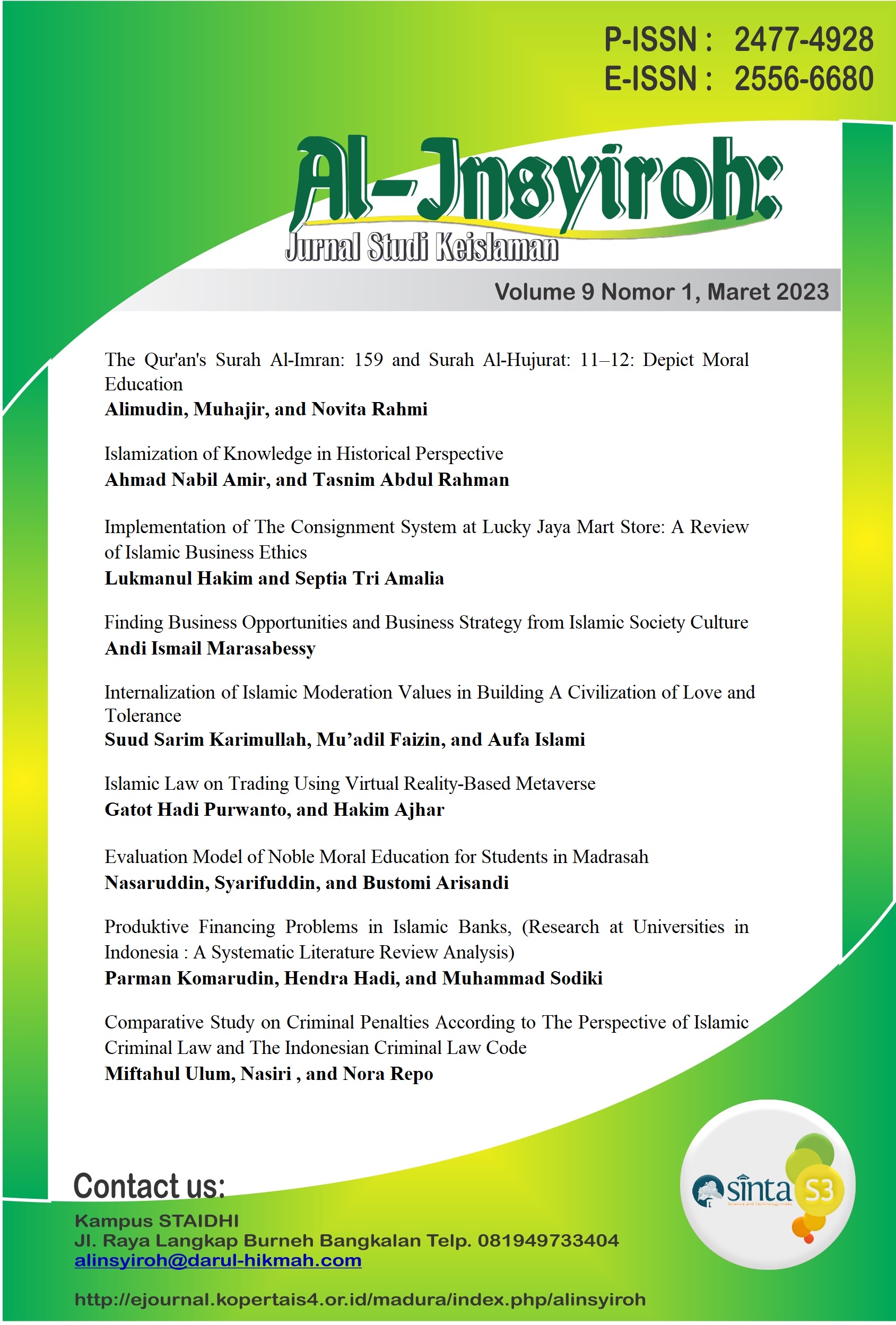Evaluation Model Of Noble Moral Education For Students In Madrasah
DOI:
https://doi.org/10.35309/alinsyiroh.v9i1.6360Keywords:
Evaluation Model, Moral Education, MadrasahAbstract
This article aims to find out the model for evaluating noble character education by schools or institutions in instilling noble character values for students in the madrasah environment. The background of this research is that teachers and institutions have not carried out a systematic evaluation of the noble character education program for students. This type of research is program evaluation research. This evaluation is used to evaluate the noble character education program for students at Madrasah Aliyah Negeri in Bima. The approach used in this type of research is a quantitative and qualitative descriptive approach. The subjects in this evaluation were class XII students, the head of the Madrasah, Class XII Aqidah Akhlak Subject Teachers, and the Madrasah Committee at Madrasah Aliyah Negeri Bima. The data sources used in this study were questionnaires, documentation and interviews. The results of this study indicate that the evaluation model that is suitable for use by teachers and institutions is the Stake's Countenance evaluation model developed by Robert Stake. The Stake's countenance evaluation model consists of three stages, namely the antecedent (preparation stage), transaction (implementation stage), and outcome (result) stage. And this model is very appropriate for evaluating the noble character education program at Madrasah Aliyah in Bima, because these stages are interrelated with one another.References
A. Kamaruddin, Syamsu. “Character Education and Students Social Behavior.†Journal of Education and Learning (EduLearn) 6, no. 4 (2012): 223.
Abdullah, Muhammad Luthfi, Arif Sumardiono, dan Handayani Nila Praja. “Development of Android Based Learning Media in Qissah Qur’ani and Prophet Materials to Improve the Noble Achievement of Students.†AL-HAYAT: Journal of Islamic Education 3, no. 2 (2019): 149. https://doi.org/10.35723/ajie.v3i2.75.
Ahmed, Ibrahim Sulaiman, and Mufaizin Mufaizin. "The Concepts of Religious Maturity in The Application of Inter-Religious Education Model in Islamic Education." Al-Insyiroh: Jurnal Studi Keislaman 8.2 (2022): 82-97.
Aidek, Abdul Rahim, dan Raisul Islami. “Character Issues: Reality Character Problems and Solutions through Education in Indonesia.†Journal of Education and Practice 7, no. 8 (2016).
Althof, Wolfgang, dan Marvin W. Berkowitz. “Moral Education and Character Education: Their Relationship and Roles in Citizenship Education.†Journal of Moral Education 35, no. 4 (2006): 495–518. https://doi.org/10.1080/03057240601012204.
Amri, Muhammad, Saharuddin Saharuddin, dan La Ode Ismail Ahmad. “The Implementation of Islamic Education: The Process of Instilling Akhlakul Karimah (Noble Characters) for Madrasah Tsanawiyah Students.†Tadris: Jurnal Keguruan Dan Ilmu Tarbiyah 4, no. 1 (2019): 117–25. https://doi.org/10.24042/tadris.v4i1.4070.
Amri, Richard, and Deni Kurniawan. “Evaluasi Implementasi Kurikulum Pada Lembaga Kursus Dan Pelatihan Program Menjahit Di Kabupaten Bandung Barat.†Diklus: Jurnal Pendidikan Luar Sekolah 2, no. 2 (2018): 139–52.
AR, Djailani. “Strategy Character Building of Students at Excellent Schools in the City Of Banda Aceh.†IOSR Journal of Research & Method in Education (IOSRJRME) 1, no. 5 (2013): 49–59. https://doi.org/10.9790/7388-0154959.
Asni, Fathullah Al Haq Muhamad. “Analysis of the Concept of Two Kalima Shahadah Al-Tauhid and Al-Risalah According to the Qur’an and Al-Hadith.†International Journal of Academic Research in Business and Social Sciences 7, no. 10 (2017): 347–53. https://doi.org/10.6007/IJARBSS/v7-i10/3383.
Badwi, Ahmad. “Konsep Berpikir Dalam Alquran." Ash-Shahabah.†Ash-Shahabah: Jurnal Pendidikan Dan Studi Islam 2, no. 1 (2016): 50–62.
Bahruddin, Hariani &. “Peranan Pendidikan Agama Islam Dalam Membentuk Akhlak Siswa Di SMA Negeri 2 Kota Bogor.†Jurnal Mitra Pendidikan 3, no. 5 (2018): 747–756.
Bennett, Sue, Phillip Dawson, Margaret Bearman, Elizabeth Molloy, dan David Boud. “How Technology Shapes Assessment Design: Findings from a Study of University Teachers: How Technology Shapes Assessment Design.†British Journal of Educational Technology 48, no. 2 (2017): 672–682. https://doi.org/10.1111/bjet.12439.
Djollong, Andi Fitriani, and Anwar Akbar. “Peran Guru Pendidikan Agama Islam Dalam Penanaman Nilai-Nilai Toleransi Antar Ummat Beragama Peserta Didik Untuk Mewujudkan Kerukunan.†Jurnal Al-Ibrah 8, no. 1 (2019): 72–92.
Djuanda, Isep. “Implementasi Evaluasi Program Pendidikan Karakter Model CIPP (Context, Input, Process Dan Output).†Al Amin: Jurnal Kajian Ilmu Dan Budaya Islam 3, no. 1 (2020): 37–53.
Gholami, Abed, Hassan Maleki, dan Cobra Emami Rizi. “Studying the Effectiveness Degree of Active Teaching Methods on Religious and Moral Education of Students at Fifth Grade of Primary School in Shiraz from Teachers’ Point of View.†Procedia - Social and Behavioral Sciences 15, no. 2 (2011): 132–136. https://doi.org/10.1016/j.sbspro.2011.04.066.
Ginanjar, M. Hidayat. “Urgensi Lingkungan Pendidikan Sebagai Mediasi Pembentukan Karakter Peserta Didik.†Edukasi Islami: Jurnal Pendidikan Islam 2, no. 4 (2017).
Hannah, Sean T., dan Peter L. Jennings. “Leader Ethos and Big-C Character.†Organizational Dynamics 42, no. 1 (2013): 8–16. https://doi.org/10.1016/j.orgdyn.2012.12.002.
Hariadi, Fajar. “Upaya Meningkatkan Kemampuan Guru Dalam Mengembangkan Instrumen Penilaian Kelas Melalui Supervisi Klinis Mata Pelajaran Bahasa Inggris Di SMAN 4 Tanah Putih.†Jurnal Pendidikan Tambusai 4, no. 3 (2020): 3457–65.
Jannah, Miftahul. “Studi Komparasi Akhlak Terhadap Sesama Manusia Antara Siswa Fullday School Dengan Siswa Boarding School Di Kelas XI SMA IT Abu Bakar Yogyakarta.†Jurnal Pendidikan Agama Islam AlThariqah 3, no. 2 (2018): 1. https://doi.org/10.25299/althariqah.2 018.vol3(2).2216.
Junaidi, Junaidi. "Pendidikan Islam (Kedudukan dan Jenis Menurut UndangUndang)." Al-Insyiroh: Jurnal Studi Keislaman 1.1 (2015): 105-116.
LePage, Pamela, Hanife Akar, Yeliz Temli, Derya Şen, Neil Hasser, dan Ilene Ivins. “Comparing Teachers’ Views on Morality and Moral Education, a Comparative Study in Turkey and the United States.†Teaching and Teacher Education 27, no. 2 (2011): 366–75.
Makki, Muhammad, Sudirman Sudirman, Muhammad Tahir, and Abdul Kadir Jaelani. “Kinerja Manajerial Kepala Sekolah Dasar Di Kota Mataram.†Jurnal Ilmiah Profesi Pendidikan 6, no. 3 (2021): 561–69.
Mislia, Alimuddin Mahmud, dan Darman Manda. “The Implementation of Character Education through Scout Activities.†International Education Studies 9, no. 6 (2016): 130. https://doi.org/10.5539/ies.v9n6p130.
Mohd Yusoff, Mohd Zailani, dan Aswati Hamzah. “DIRECTION OF MORAL EDUCATION TEACHER TO ENRICH CHARACTER EDUCATION.†Jurnal Ilmiah Peuradeun 3, no. 2 (2015): 119. https://doi.org/10.26811/peuradeun.v3i1.58.
Muhammad, A. R., and Suhaimi Sulaiman. “Industry 4.0 and the Impact of Moral Values for Madrasah ‘Aliyah Negeri Students in Indonesia.†Journal of Talent Development and Excellence 12, no. 3 (2020): 1489–97.
Mulyani, Endang. “Model Pendidikan Kewirausahaan Di Pendidikan Dasar Dan Menengah.†Jurnal Ekonomi Dan Pendidikan 8, no. 1 (2011).
Muttaqin, Muhamad Fauzan, dan Tri Joko Raharjo. “The Implementation Main Values of Character Education Reinforcement in Elementary School,†2018.
Nevo, David. “The Conceptualization of Educational Evaluation: An Analytical Review of the Literature.†Review of Educational Research 53, no. 1 (1983): 117–28. https://doi.org/10.3102/00346543053001117.
Nobisa, Yahya Nikmad. “KERJASAMA ORANGTUA DAN GURU PENDIDIKAN AGAMA ISLAM DALAM MENINGKATKAN MUTU PENDIDIKAN AGAMA ISLAM.†TA’LIM: Jurnal Pendidikan Agama Islam Dan Manajemen Pendidikan Islam 1, no. 1 (2022): 24–30.
Rohman, Nur. “Peran Kepala Sekolah Dalam Peningkatan Mutu Pendidikan Perspektif Manajemen Mutu Terpadu Studi Kasus Di Sdut Bumi Kartini Jepara.†Tarbawi: Jurnal Pendidikan Islam 14, no. 2 (2017).
Sampson, Margaret, Jessie McGowan, Elise Cogo, Jeremy Grimshaw, David Moher, dan Carol Lefebvre. “An Evidence-Based Practice Guideline for the Peer Review of Electronic Search Strategies.†Journal of Clinical Epidemiology 62, no. 9 (2009): 944–952. https://doi.org/10.1016/j.jclinepi.2008.10.012.
Sarifudin. “Implementasi Supervisi Kepala Sekolah Terhadap Kinerja Guru Dalam Upaya Meningkatkan Kualitas Pembelajaran Di Madrasah Ibtidaiyah Negeri (Min) Kota Bogor.†Islamic Management: Jurnal Manajemen Pendidikan Islam 2, no. 1 (2019): 49–70.
Slameto. “Permasalahan-Permasalahan Terkait Dengan Profesi Guru SD.†Scholaria: Jurnal Pendidikan Dan Kebudayaan 4, no. 3 (2014): 1–12.
Steinberg, Laurence. “Cognitive and Affective Development in Adolescence.†Trends in Cognitive Sciences 9, no. 2 (2005): 69–74. https://doi.org/10.1016/j.tics.2004.12.005.
Syafi’i, Ahmad, Tri Marfiyanto, and Siti Kholidatur Rodiyah. “Studi Tentang Prestasi Belajar Siswa Dalam Berbagai Aspek Dan Faktor Yang Mempengaruhi.†Jurnal Komunikasi Pendidikan 2, no. 2 (2018): 115–23.
Syaikhon, Muhammad, Nanang Rokhman Saleh, and Bahrul Ulum. "The Role of Principal in Improving PAI Learning in The Corona Pandemic Period in RA TAAM Adinda Care to Overcome Gresik." Al-Insyiroh: Jurnal Studi Keislaman 7.2 (2021): 75-88.
Tolchah, Moch. “THE POLITICAL DIMENSION OF INDONESIAN ISLAMIC EDUCATION IN THE POST-1998 REFORM PERIOD.†OURNAL OF INDONESIAN ISLAM 8, no. 2 (2014): 284. https://doi.org/10.15642/JIIS.2014.8.2.284-298.
Tudor, Sofia Loredana. “Formal – Non-Formal – Informal in Education.†Procedia - Social and Behavioral Sciences 7, no. 6 (2013): 21–26. https://doi.org/10.1016/j.sbspro.2013.04.213.
U Mu’min, Abdullah. “Character Education Building through Reciting á¹¢alawÄt.†International Journal of Nusantara Islam 5, no. 2 (2017): 222–32.
Downloads
Published
How to Cite
Issue
Section
License
Copyright (c) 2023 Al-Insyiroh: Jurnal Studi Keislaman

This work is licensed under a Creative Commons Attribution-ShareAlike 4.0 International License.

This work is licensed under a Creative Commons Attribution-ShareAlike 4.0 International License.









